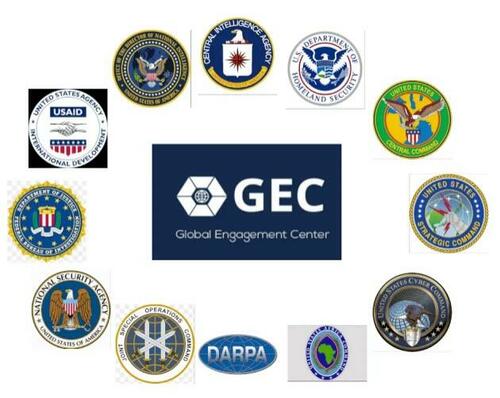
The list of state-funded entities pushing narratives, crushing questions, demanding censorship, and feeding the liberal media unsourced ‘facts’ is about to grow dramatically as the shadowy line between First Amendment protections and Orwellian DoubleSpeak gets blurred by Matt Taibbi’s latest exposition from his delving deeper into The Twitter Files.
In the recent past, we have seen the farce of ‘Hamilton68’ and its efforts to tamp down any dissenting voice of reason as ‘Russian-sponsored influence and disinformation campaigners’.
Today, we find about about The Global Engagement Center (GEC), The Atlantic Council’s Digital Forensic Research Lab (DFRLab), The Alliance for Securing Democracy (ASD), and New Knowledge (NK) – all doing similar censorious things by similar censorious methods, demanding social media entities blacklist accounts for the barest minimum of reasons.
The silver lining of this exposure is that not just does this reduce their reach by their actions being brought into the light, but it turns out that several Twitter executives, including Trust and Security chief Yoel Roth, rejected many of these requests, even going so far as to mock some of the requests. One former intel source sums up the situation perfectly in his comments to Taibbi:
“It’s an incubator for the domestic disinformation complex…” specifically discussing the GEC, but the comments could apply to any of these entities, adding,
“all the shit we pulled in other countries since the Cold War, some morons decided to bring home.”
Matt Taibbi and the team at Racket put together the following thread of examples of that ‘shit’…
Take a breath…
“Hi guys. Attached you will find… around 40k twitter accounts that our researchers suspect are engaging in inauthentic behavior… and Hindu nationalism more broadly.”

DFRLab said it suspected 40,000 accounts of being “paid employees or possibly volunteers” of India’s Bharatiya Janata Party (BJP).
But the list was full of ordinary Americans, many with no connection to India and no clue about Indian politics.
“I have no connection to any Hindu folks… Just a Reagan Republican here in CT,” replied “Bobby Hailstone.”
“A Hindu nationalist? I’ve never even been out of this country. Let alone the state of NJ,” said “Lady_DI816.”
“These people are insane!” said “Krista Woods.”
Twitter agreed, one reason many of the accounts remain active.
“Thanks, Andy,” replied Trust and Safety chief Yoel Roth.
“I spot-checked a number of these accounts, and virtually all appear to be real people.”
DFRLab is funded by the U.S. Government, specifically the Global Engagement Center (GEC).
Director Graham Brookie denies DFRLab it uses tax money to track Americans, saying its GEC grants have “an exclusively international focus.”
But Americans on DFR’s list, like Marysel Urbanik, are unconvinced its focus is “exclusively international.”
“This is un-American,” says Urbanik, who immigrated from Castro’s Cuba.
“They do this in places that don’t believe in free speech.”

The Global Engagement Center is usually listed as a State Department entity.
It’s not.
Created in Obama’s last year, GEC is an interagency group “within” State, whose initial partners included FBI, DHS, NSA, CIA, DARPA, Special Operations Command (SOCOM), and others.
GEC’s mandate: “To recognize, understand, expose, and counter foreign… disinformation.”
On the surface, it’s the same mission the United States Information Agency (USIA) fulfilled for decades, with a catch. USIA focused on foreign “disinfo.”
GEC’s focus is wider.
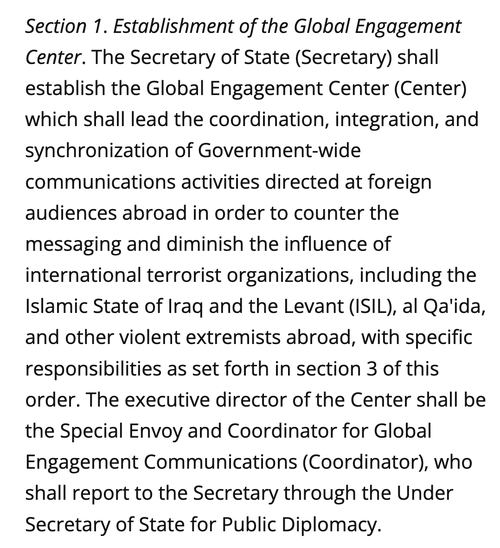
GEC could have avoided controversy by focusing on exposing/answering “disinformation” with research and a more public approach, as USIA did. Instead, it funded a secret list of subcontractors and helped pioneer an insidious – and idiotic – new form of blacklisting.
GEC’s “Chinese” list included multiple Western government accounts and at least three CNN employees based abroad.
“Not exactly Anderson’s besties, but CNN assets if you will,” quipped Twitter’s Patrick Conlon.
“A total crock,” added Trust and Safety chief Yoel Roth.

GEC passed some good information to Twitter, but mostly not.
Taibbi points out that the root problem was exemplified by a much-circulated 2020 report, “Russian Pillars of Disinformation and Propaganda.”
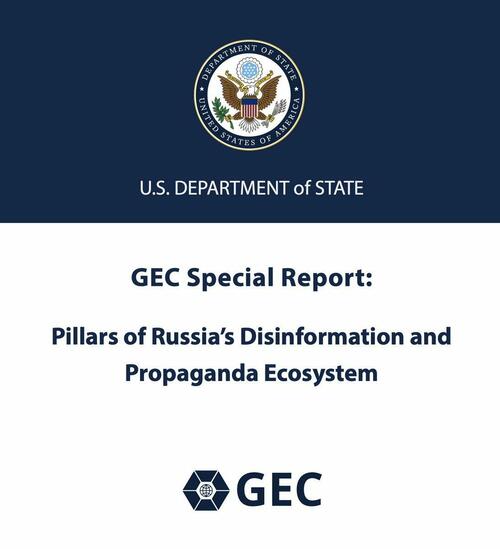
This GEC report was contradictory.
On one hand, it offered reasoned evidence that a specific outlet was partnered with the Russian Foreign Ministry, which would make it a true “proxy site.”
However, the same report advanced a far lazier idea.
Along with state actors, groups that “generate their own momentum” should also be seen as parts of a propaganda “ecosystem.”
Independence, GEC said, should not “confuse those trying to discern the truth.”
And while the “ecosystem” is not a new concept. It’s been with us since Salem: guilt by association.
As one Twitter exec put it perfectly:
“‘If you retweet a news source linked to Russia, you become Russia-linked,’ does not exactly resonate as a sound research approach.”
GEC sent Twitter a series of reports on a series of topics, often employing the “ecosystem” concept.
Its report on France “attributes membership in the yellow vest movement as being Russia-aligned,” is how Twitter’s Aaron Rodericks put it.
GEC’s report on China was “more entertainment value than anything,” said Rodericks.
“It equates anything pro-China, but also anything against China in Italy, as part of Russia’s strategy.”

And so, as Taibbi reports, Twitter staffers showed professionalism.
They tended to look at least once before declaring a thing foreign disinformation. This made them a tough crowd for GEC.
Fortunately, there’s an easier mark: the news media.
GEC’s game was simple:
1. create an alarmist report,
2. send it to the slower animals in journalism’s herd,
3. and wait as reporters bang on Twitter’s door, demanding to know why this or that “ecosystem” isn’t obliterated.
Twitter emails ooze frustration at such queries. UGGG! reads one.
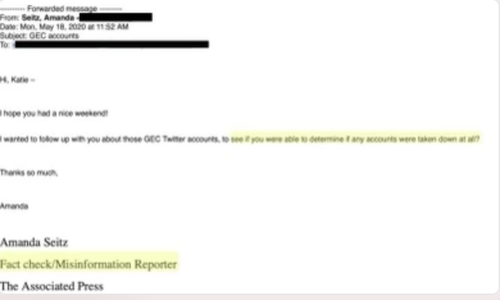

Roth noted Bret Schafer of the Alliance for Securing Democracy was quoted in Frenkel’s story and said: “Seems like ASD are back at their old tricks.”
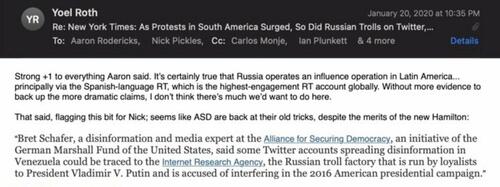
Roth was referring to the fact that the ASD created Hamilton 68, another guilt-by-association scheme detailed in Twitter Files #15.
The Hamilton “dashboard” claimed to track accounts linked to “Russian influence activities,” but the list was largely made up of Americans.
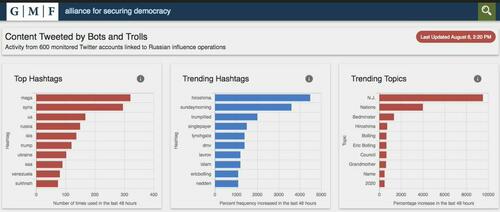
But facts didn’t matter to these fact-checkers…
In a crucial in-house Q&A in mid-2017, Roth was asked if it was possible to detect “Russian fingerprints” using Twitter’s public data.
Though “you can make inferences,” he said, “in short, no.”

Twitter therefore knew from the first days of the “foreign interference” mania that the media zone was flooded with bad actors playing up cyber-threats for political or financial reasons, GEC included.
“GEC has doubled their budget by aggressively overstating threats through unverified accusations that can’t be replicated either by external academics or by Twitter,” wrote Rodericks.
The same is true of New Knowledge, the scandal-plagued company staffed by former NSA officials that the Senate Select Committee on Intelligence (SSCI) hired to do “expert” assessments of the initial batches of “suspect” Facebook and Twitter accounts.

When Twitter saw New Knowledge and its reporter-worshipped “disinformation” gurus like Jonathon Morgan and Renee DiResta were making analytical leaps they felt were impossible, they knew something was off.
After Politico cited a New Knowledge report to the SSCI as evidence for what it called a “sweeping effort to sow divisions,” Twitter dug in.
NK pointed to five supposedly Russian accounts it said were “relatively easy to find with the Twitter public API.”
Roth scoffed.
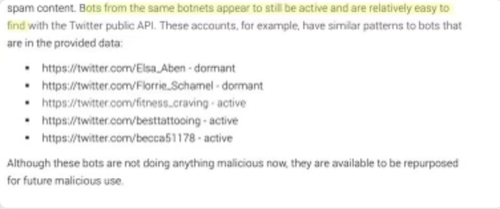
Roth said two of the five accounts were a “small Indonesian content farm… just commercial spam. (Would suspend but don’t want to throw fire on the NK report by making anyone think they’re correct.) Becca account is an American and not at all suspicious.”
Twitter’s Nick Pickles: “New Knowledge’s pitch… pick accounts that they have deemed to be IRA controlled, and then spin up bigger macro analysis… stories about ‘2000 Russian accounts tweeting about Kavanagh/Walkway/Caravan’ [were] often based on media activity from NK.”

As Matt Taibbi concludes, just like Hamilton 68, GEC and New Knowledge littered the media landscape with flawed or flat-out wrong news stories.
Exacerbating matters, Americans in both cases paid taxes to become the subject of these manipulative operations.
Foreign cyber-threats exist, and there are sophisticated ways of detecting them.
But GEC and its subcontractors don’t use those, instead deploying junk science that often lumps true bad actors in with organic opinion.
Twitter comms official Ian Plunkett wrote years ago that “misinformation, like [countering violent extremism, or CVE] before it, is becoming a cottage industry.”
Disinformation is the counterterrorism mission, rebranded for domestic targets.
Reauthorization for GEC’s funding is up for a vote this year. Can we at least stop paying to blacklist ourselves?
